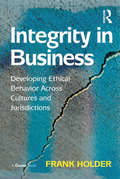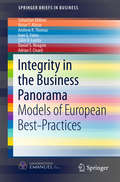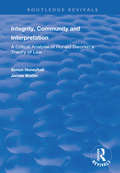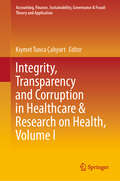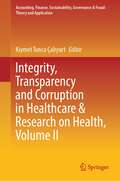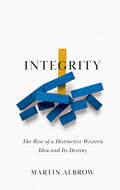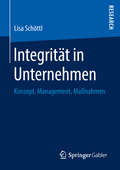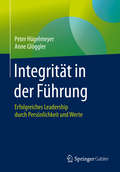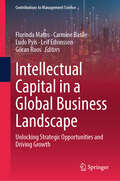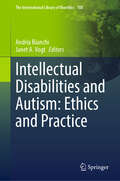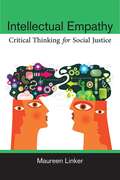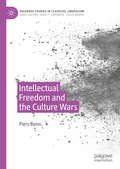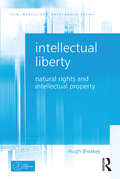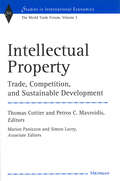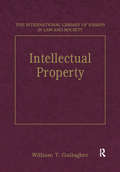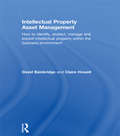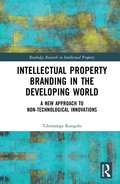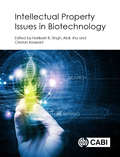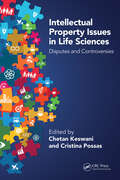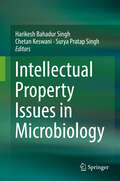- Table View
- List View
Integrity in Business: Developing Ethical Behavior Across Cultures and Jurisdictions
by Frank HolderBusiness integrity is rarely a matter of straight-forward rules. As the nature and geography of business transactions become more complex, managers are required to make judgements and to tackle new ethical dilemmas that are often local and situational. Integrity in Business explores the complex nature of integrity and business and illustrates how organizations have avoided major setbacks to their reputations and value by encouraging integrity. It also examines those organizations that have failed or experienced serious reputational damage due to lack of preparation, lack of transparency and lack of leadership. Frank Holder analyzes how transparency and integrity depend on a state of balance in competition and knowing who you are doing business with. He explains the significance of leadership awareness which, whilst now global, is alert to the need to establish integrity in local markets. Using his research from a review of significant fraud cases, legislative mandates and governmental and nongovernmental initiatives over the past 15 years, the author provides a rigorous and sophisticated guide to understanding and adopting an holistic business integrity strategy- one which has a realistic chance of protecting your organization from the kind of catastrophic loss or reputational damage that can easily be the result of an error of judgement in a world that is increasingly connected and driven by instant and social media.
Integrity in the Business Panorama
by Sebastian Văduva Victor T. Alistar Andrew R. Thomas Ioan S. Fotea Călin D. Lupiţu Daniel S. Neagoie Adrian F. CioarăThis volume explores the value of business integrity and ethics as a "best practice" model in business strategy. The authors define business integrity, explore areas in which integrity is often absent or discredited, and provide a framework and tools to help build better business ethics and corporate social responsibility. The volume aims to reveal that beyond the immediate economic effect, corruption can ruin entire countries by destabilizing key economic and political players, warping their vision for state development. Against the backdrop of global financial and ethical crises, the authors argue that integrity in business is a key component for long-term success. Integrity includes the ability to be consistent with one's moral values and principles and places society's wishes at the center of business decision-making. The cornerstone upon which a culture of integrity is built within a certain business is the ethics code. It explicitly states the values and principles to which a company adheres. The continuous promotion, support and communication of the ethics code stipulations provide the basis upon which integrity in business is built. Featuring case studies from countries such as Sweden, Great Britain and France and companies such Starbucks, Nike, PSEG, and Anglo-American PLC, this volume provides a comprehensive study of business integrity and social responsibility that will be of interest to students, scholars, professionals and policy-makers from around the world.
Integrity of Scientific Research: Fraud, Misconduct and Fake News in the Academic, Medical and Social Environment
by Joel Faintuch Salomão FaintuchThis book provides a scientific and ethical approach to all forms of fraud and misconduct focusing on a scholarly however practice-oriented description of the problems, roots and potential solutions.Organized in dedicated parts, an international team of experts systematically analyzes the most prevalent forms of misconduct, ghost writing, pseudo-science, dubious trials, predatory journals, fake news, mistreatment and harassment, in research, publications, at academic institutions, and in the professional and healthcare environment. A special focus is given to corrective interventions and the role of prevention, education and training. Comprehensive in its scope, the book offers an easy-to-read overview along with a number of real cases for experienced and novice personnel alike. The significance of scientific integrity and research ethics increased during the last couple of years and ethic committees and offices have become an integral part at universities, hospitals, research institutions, government agencies and major private organizations all over the world. Thus, this book provides an indispensable, comprehensive overview across disciplines and for everybody working in research and affiliated institutions.
Integrity, Community and Interpretation: Critical Analysis of Ronald Dworkin's Theory of Law (Routledge Revivals)
by Simon Honeyball James WalterFirst published in 1998, this volume examines the work of Ronald Dworkin, the leading legal philosopher of our time, ten years after his seminal work, Law’s Empire. Its impact and influence was so extensive that the authors felt compelled to undertake both an in-depth analysis of both the book itself and its critical reaction, including a survey of the literature on Law’s Empire.
Integrity, Transparency and Corruption in Healthcare & Research on Health, Volume I (Accounting, Finance, Sustainability, Governance & Fraud: Theory and Application)
by Kıymet Tunca ÇalıyurtThis book grapples with the numerous risks organizations face in order to succeed. These include economic risks, disaster risks, supply-chain risks, regulatory risks, and technology risks, all of which affect organizations in different ways and in varying degrees. Referencing Mahatma Gandhi’s seven unethical behaviors in the business world—wealth without work, pleasure without conscience, knowledge without character, commerce without morality, science without humanity, religion without sacrifice, and politics without principle—the authors analyze the healthcare sector. As competition in the health sector increases, there has also been a rise in unethical behavior. Corruption in the health sector results in severe consequences as it could affect the health of millions. This volume explores fraud schemes and cases, legislation to avoid cheating, lack of law, transparency, ethical issues, corporate governance and transparency in the health and pharmaceutical sector bringing together the perspectives of practitioners, professionals, as well as academic authors.
Integrity, Transparency and Corruption in Healthcare & Research on Health, Volume II (Accounting, Finance, Sustainability, Governance & Fraud: Theory and Application)
by Kıymet Tunca ÇalıyurtThis book continues the discussion from Volume I on the risks organizations face in order to succeed with a special focus on the challenges brought on by the COVID-19 virus crisis. Taking on an interdisciplinary focus, the book brings together research from academics and practitioners from all over the world. Topics considered range from corruption in the health sector and COVID-19, eHealth efforts of countries during the pandemic, and fiscal policies and transparency in data sharing for effective management of the pandemic to a path forward to achieve health for all.
Integrity: The Rise of a Distinctive Western Idea and Its Destiny
by Martin AlbrowPublic life is dominated from time to time by media storms around integrity. The behaviour of elected political leaders has led many to decry the deterioration in standards and the lack of integrity in public life. But what is integrity, and where does our concern with integrity in public life come from? In this book, Martin Albrow argues that integrity has been an essential component of the rise of the West and a key feature that distinguishes the West from other civilizations. He traces the idea of integrity back to its roots in ancient Greece and Rome, where integrity acquired its special meaning: the unique feature of any object with integrity was that it combined its wholeness or completeness with the embodiment of standards that came from outside it. Integrity was unity through values. He then follows the story of integrity through early Christianity and the Renaissance to the present day. Today, we find ourselves in the paradoxical situation where the lack of integrity in public life is widely condemned while, at the same time, politicians can remain popular without even pretending to act with integrity: this is the new politics of the integrity vacuum. The idea of integrity may be a distinctively western one but, like many other aspects of western culture, it has now become a property of worldwide society. Albrow concludes by arguing that integrity could add more value today by being combined with non-western wisdom as we strive to create an order where honesty, trust and reliability in our relationships with others are paramount. This highly original account of an idea that lies at the heart of western culture will be of interest to anyone concerned about the state and future of our public life.
Integrität im Managementalltag: Ethische Dilemmas im Managementalltag erfassen und lösen
by Patrick S. Renz Bruno Frischherz Irena WettsteinGeschenke und Gefälligkeiten, Entlassungen, Mobbing, Billiglohnproduktion oder Einsatz von Cookies oder Persönlichkeitsprofilen – Das Spektrum an möglichen Spannungsfeldern im Unternehmensalltag ist groß. Mit der Digitalisierung sind die ethischen Herausforderungen noch größer. Dieses Open Access Buch führt Führungskräfte in die Erfassung und Lösung ethischer Dilemmas im Unternehmensalltag ein. Praxisnah und konkret stellt es sieben Leitideen als ethisches Fundament und ein Ablaufschema zur Lösung ethischer Dilemmas vor. 32 häufige Spannungsfelder werden anhand von kurzen Fallbeispielen analysiert und diskutiert. Das Buch präsentiert zudem einfache, aber auch umfassende Good Practices eines modernen Integritätsmanagements. In Zeiten, in denen der Ruf nach der Wahrnehmung von sozialer, gesellschaftlicher und digitaler Verantwortung von Unternehmen immer lauter wird, gibt dieses Lehrmittel den Führungskräften einen Leitfaden an die Hand, wie sie ethische Dilemmas im Unternehmensalltag strukturiert angehen können.Die zweite Auflage enthält ein völlig neues Kapitel mit sieben Fallbeispielen zur Corporate Digital Responsibility (CDR), das heißt, zur Verantwortung von Unternehmen im Zeitalter der Digitalisierung. Der InhaltGrundbegriffe der EthikSpannungsfelder in OrganisationenEthische DilemmasLeitideen guter ZusammenarbeitFallbeispiele zum IntegritätsmanagementFallbeispiele zur Corporate Digital Responsibility (CDR)Good Practices im IntegritätsmanagementDies ist ein Open-Access-Buch.
Integrität in Unternehmen: Konzept, Management, Maßnahmen
by Lisa SchöttlUnternehmen stehen in der Verantwortung, eine Vielzahl an Werten in ihrem Geschäft zu beachten, allen voran den der Integrität. Das Buch beantwortet die Frage, was Integrität für Unternehmen bedeutet und wie integres Unternehmenshandeln erreicht werden kann. Die Autorin entwickelt einen theoretisch fundierten und praktisch anwendbaren Ansatz der Unternehmensintegrität und gibt Orientierung, wie dieser durch vielfältige Maßnahmen im Rahmen von Integrity Management umgesetzt werden kann. Dabei werden klassische Compliance-Ansätze um eine werteorientierte Perspektive ergänzt, damit Unternehmen ihre je eigene Verantwortung wahrnehmen können.
Integrität in der Führung: Erfolgreiches Leadership durch Persönlichkeit und Werte
by Peter Hügelmeyer Anne GlögglerIntegrität der Führungspersönlichkeit als zentraler Erfolgsfaktor für Unternehmens- und MitarbeiterführungMitarbeiter- und Unternehmensführung ist von Zielkonflikten, Veränderungen und Mehrdeutigkeiten geprägt. In dieser komplexen Situation ist Integrität der Schlüsselbegriff für erfolgreiches Leadership. Eine integre Führungspersönlichkeit reflektiert ihre Werte regelmäßig und hinterfragt ihre Haltung und ihre Handlungen. Konkret äußert sich integres Verhalten in einer hohen Personenorientierung, d. h. der Mitarbeitende steht als Mensch im Zentrum des Handelns und wird bei Entscheidungen aktiv einbezogen. Auf der Unternehmensebene sind es praktizierte Solidarität, Nachhaltigkeit und das Gemeinwohl. Lang bekannte Prinzipien erleben eine ungeahnte Renaissance in der modernen Führung. Zudem ist eine kontinuierliche Weiterentwicklung der Mitarbeitenden und der eigenen Organisation essenziell.Das Buch liefert Denkanstöße, macht Führungskräfte begründungssicher und regt zur eigenen Reflexion an. Es enthält viele direkt umsetzbare Tipps, wie in komplexen Situationen agil gehandelt und wie integre Führung konkret praktiziert werden kann.Aus dem Inhalt Integrität in der Führung: Werte, Haltungen und Handlungen erfolgreicher FührungspersönlichkeitenDer Mensch im Mittelpunkt: Persönlichkeit und WertschätzungIntegre Techniken der Mitarbeiter- und UnternehmensführungIntegre FührungskommunikationIntegre Führung in Veränderungs- und EntwicklungsprozessenKonkrete Tipps zur Umsetzung integrer und agiler Führung
Inteligencia ética para la vida cotidiana
by Diana Cohen AgrestTextos breves de ética de divulgación, con un enfoque laico y plural,expresados en un lenguaje coloquial y escritos con el propósito de queel lector pueda reconocerse en ellos. Una invitación a pensar crítica y reflexivamente, en torno a nuestrasvidas. Conciliando lo que creemos ser, lo que somos y lo que aspiramos aser.
Intellectual Capital in a Global Business Landscape: Unlocking Strategic Opportunities and Driving Growth (Contributions to Management Science)
by Leif Edvinsson Göran Roos Florinda Matos Carmine Basile Ludo PyisIn today&’s dynamic global marketplace, intangible assets and Intellectual Capital have become pivotal in determining corporate value and driving strategic success. To remain competitive and innovative, business leaders must not only protect but also effectively leverage intellectual capital. This insightful book explores the transformative power of intellectual capital in shaping business success and societal progress. Combining theoretical insights with practical strategies, it offers readers a comprehensive guide to understanding, building, and sustaining intellectual capital. Through real-world examples and in-depth case studies, the authors demonstrate how organisations can harness intellectual capital to foster innovation, create lasting value, and adapt to the rapidly evolving business landscape. An essential resource for business leaders, strategists, and academics, this book provides the tools and knowledge necessary to thrive in today&’s knowledge-driven economy, while contributing to a better, more sustainable society.
Intellectual Disabilities and Autism: Ethics and Practice (The International Library of Bioethics #108)
by Andria Bianchi Janet A. VogtThis book meaningfully reflects upon difficult, timely, and debated ethics questions relating to people with intellectual disabilities (IDs) and autistic people. The book challenges now dated perceptions and introduces innovative ideas by leading scholars regarding some of the most complex, controversial, and relevant ethical dilemmas involving these neurodiverse populations. People with IDs and/or those on the autism spectrum continue to experience various forms of oppression and unjust treatment across the globe, despite the UN Convention on the Rights of Persons with Disabilities (CRPD). The collection explores questions such as: Can people with IDs make informed decisions about their medical treatment, living circumstances, and overall life? What are the ethical implications of selective termination of pregnancy based on a gene linked to a condition conferring intellectual impairment? How can we ensure that people with IDs and autistic people are meaningfully included in research? Can people with IDs successfully parent? How can we support the capabilities of neurodiverse populations such that they enjoy the rights afforded by the CRPD? Each contributor critically examines how we can move forward to create a world that understands and respects the rights of every person with ID and/or autism. An indispensable read for bioethicists, ethics students, social justice scholars, and others interested in and working with people with IDs and autistic people.
Intellectual Empathy: Critical Thinking For Social Justice
by Maureen LinkerIntellectual Empathy provides a step-by-step method for facilitating discussions of socially divisive issues. Maureen Linker, a philosophy professor at the University of Michigan–Dearborn, developed Intellectual Empathy after more than a decade of teaching critical thinking in metropolitan Detroit, one of the most racially and economically divided urban areas, at the crossroads of one of the Midwest’s largest Muslim communities. The skills acquired through Intellectual Empathy have proven to be significant for students who pursue careers in education, social work, law, business, and medicine. Now, Linker shows educators, activists, business managers, community leaders—anyone working toward fruitful dialogues about social differences—how potentially transformative conversations break down and how they can be repaired. Starting from Socrates’s injunction know thyself, Linker explains why interrogating our own beliefs is essential. In contrast to traditional approaches in logic that devalue emotion, Linker acknowledges the affective aspects of reasoning and how emotion is embedded in our understanding of self and other. Using examples from classroom dialogues, online comment forums, news media, and diversity training workshops, readers learn to recognize logical fallacies and critically, yet empathically, assess their own social biases, as well as the structural inequalities that perpetuate social injustice and divide us from each other.
Intellectual Freedom and the Culture Wars (Palgrave Studies in Classical Liberalism)
by Piers BennThis book offers a sustained and vigorous defence of free expression and objective enquiry situated in the context of the current culture wars. In the spirit of J. S. Mill, Benn investigates objections to the ideal of free expression in relation to harm and offence, reaching broadly liberal conclusions with reference to recent examples of attempts to curb free speech on university campuses. Accepting that some expressions can cause non-physical harm, Benn also considers objections to free speech based on certain understandings of power and privilege. In its exploration and rejection of arguments against the possibility of obtaining objective truth, the book navigates hotly contested fields of contemporary debate, including feminism and identity politics. It challenges the dogma of social constructionism and examines current notions of identity, arguing that a case for fairness can be made without appealing to them. Offering a qualified endorsement of friendship between ideological opponents, Benn highlights common obstacles to civil and rational discussions, concluding with a rational, moral, and broadly spiritual solution to the cultural combat that monopolises present-day society.
Intellectual Liberty: Natural Rights and Intellectual Property (Law, Ethics And Governance Ser.)
by Hugh BreakeyConsidering the steady increase in intellectual property rights in the last century, does it make sense to speak of ’user’s rights’ and can limitations on intellectual liberty be justified from a rights-based perspective? This book philosophically defends the importance of the public domain and user’s rights through the use of natural-rights thought. Utilizing primarily the work of John Locke, it contends that considerations of natural justice and human freedom impose powerful constraints on the proper reach and substance of intellectual property rights, especially copyright. It investigates both the internal and external natural-rights constraints on intellectual property, and argues in particular for the importance to human freedom of the right to intellectual liberty - the right to inform one’s actions by learning about the world. It concludes that respect for fundamental freedom-based interests require a balanced approach to the scope, strength and duration of intellectual property rights.
Intellectual Property
by Paul GoldsteinThis book is the first detailed historical account of intellectual property law. In part, it examines why intellectual property law with its subcategories of patents, copyright, designs and trade marks took the shape that it did over the course of the nineteenth century. In addition the authors deal with ways in which the law grants property status to intangibles and describe how the law came to create techniques that enabled it to recognize protectable intangibles, and the inescapable problems that have arisen from their use.
Intellectual Property
by Thomas Cottier Petros C. MavroidisThe incorporation of intellectual property protection into the WTO international trading system has been a milestone in international economic law and has added a new dimension to trade regulation — new rights and obligations and new challenges alike. The contributors, leading scholars and practitioners in the field, provide insights into the legal relationship of the TRIPs Agreement to the GATT 94 and the GATS. The book widens the debate with a thorough discussion on pending and unresolved relations of TRIPs, the WTO, UPOV, the Convention on Biodiversity and Farmers' Rights contained in the FAO International Undertaking, and efforts of the World Bank GCIAR system, including IPGRI. What will be the impact of TRIPs on ownership of plant genetic resources? Largely a victory for OECD countries, the present state of intellectual property rights has important implications for developing countries. The incorporation of intellectual property rights into the WTO system will eventually change the relationship of trade, competition, and intellectual property. It will equally have to assist in providing equitable sharing of benefits in the use of plant genetic resources. All of these issues are essential for the revision of exclusions from patenting in TRIPs. This volume offers insights into how this difficult task could and should be approached in a balanced manner and will be essential reading for economists and trade and intellectual property lawyers interested in the subject. Moreover, the volume will be relevant to agricultural economists as it addresses complex problems in the interstices of trade, intellectual property, plant genetic resources, and sustainable development.
Intellectual Property (The International Library of Essays in Law and Society)
by William T. GallagherThis book brings together articles by leading international scholars from diverse disciplinary perspectives who focus on the legal, social and cultural dimensions of intellectual properties - including patents, copyrights, trademarks, trade secrets and rights of publicity. These articles employ a creatively eclectic approach to the study of intellectual property law and policy viewed through the lenses of traditional doctrinal analysis, historical perspectives, critical cultural study, and empirical examinations of intellectual property in action. The volume also directs critical attention to the significance of intellectual property in contemporary processes of globalization and political economy.
Intellectual Property Asset Management: How to identify, protect, manage and exploit intellectual property within the business environment
by David Bainbridge Claire HowellIn the new ‘knowledge-intensive economies’ Intellectual assets increasingly play a key part on balance sheets. There is an increasing global awareness that in order to promote innovation and the growth of the economy, businesses must fully recognise and exploit their intellectual assets. A company’s ability to innovate rapidly and successfully is now regarded as essential and most breakthroughs are made by Small and Medium-sized Enterprises (SMEs), usually with no in-house legal professionals to help them. It is essential that those working with or creating intellectual property rights (IPR) are aware of the basics of Intellectual Property Law. Intellectual Property Asset Management provides business and management students at all levels with an accessible-straight-forward explanation of what the main Intellectual Property rights are and how these rights are protected. Locating the subject squarely in a business context and using case studies and examples throughout drawn from a wide range of business organisations, it explains how an organisation can exploit their rights through licensing, franchising and other means in order to make the best possible use of their IP assets. This book will provide students with:• the basic Intellectual Property law knowledge needed to identify a potential IP issue• the tools and understanding to assess an IP breach• the ability to identify where the problem cannot be solved in house and where expert legal assistance is required • the knowledge required to work effectively with lawyers and other legal professionals to achieve the desired outcome
Intellectual Property Branding in the Developing World: A New Approach to Non-Technological Innovations (Routledge Research in Intellectual Property)
by Tshimanga KongoloIntellectual Property Branding in the Developing World identifies success stories in the areas of intellectual property (IP) and branding for non-technological innovation in the developing world. The author examines the relationship between IP, branding and innovation to demonstrate that innovation, in general, and non-technological innovation, in particular, must go hand in hand with branding. Branding of non-technological innovations should be a good strategic tool to be used by countries in the developing world mainly in the areas where they have competitive advantages. This book will assist scholars and academics dealing with innovation, branding, and IP issues, providing context and guidance to policymakers from the developing world. It is also relevant to researchers and students in the fields of intellectual property law, commercial law, international law, management, and innovation.
Intellectual Property Issues
by Ulrich Storz Johanna Driehaus Wolfgang FlascheSpringerBriefs in Biotech Patents present timely reports of intellectual properties (IP) issues and patent aspects in the field of biotechnology. This new volume in the series focuses on the particular IP issues of therapeutics, vaccines and molecular diagnostics. The first chapter concentrates on basics principles for protecting antibody compounds. Additional ways to create follow-up protection for antibody therapeutics are also discussed. The second chapter gives an overview of the patent landscape in molecular diagnostics, and discusses issues of patentability with respect to the different technologies and compounds used therein. The third chapter gives a broad overview of areas of law that are particularly relevant to the patenting of peptide vaccines and therapeutic peptides as products and in compositions. The scope of patentable subject matter is discussed, as it has been the focus of much wrangling and debate in the courts.
Intellectual Property Issues in Biotechnology
by Alok Jha Harikesh B. Singh Chetan KeswaniAdopting a unique approach, and with case studies and examples from developing economy markets, this book integrates science and business to provide an introduction and an insider view of intellectual property issues within the biotech industry. Broad in scope, the book covers key principles in pharmaceutical, industrial and agricultural biotechnology within four sections. The first section details the principles of intellectual property and biotechnology, the second section covers plant biotechnology, including biotic and abiotic stress tolerance, GM foods in sustainable agriculture, microbial biodiversity and bioprospecting for improving crop health and productivity, and production and regulatory requirements of biopesticides and biofertilizers. The third section describes recent advances in industrial biotechnology, such as DNA patenting, and commercial viability of the CRISPR/Cas9 system in genome editing. The final section describes intellectual property issues in drug discovery and development personalized medicine, and vaccines in biodefense.
Intellectual Property Issues in Life Sciences: Disputes and Controversies
by Chetan Keswani Cristina PossasIntellectual Property Issues in Life Sciences: Disputes and Controversies highlights emerging legal, social, and regulatory issues pertaining to various areas of life sciences. Patents occupy a prominent position in the innovation systems in the life sciences, but to what extent they support, or hinder innovation is widely disputed. Life science is a broad subject including agriculture, ecology, microbiology, plant and animal sciences, health and diseases, biotechnology, etc. However, despite the broad applications of biotechnology and molecular biology techniques, profits on investments are surprisingly low. Thus, it is vitally important for universities, public research organizations, and private enterprises to protect their innovations. There are vast differences of opinion on patentability of living organisms, which are largely barred from patent protection. However, mind-sets are rapidly shifting and IP issues in life sciences are receiving increasing attention. To compete with progressive bio-based economies the developing countries are amending their IP laws to encourage investment.An effort has been made to avoid considering policy in isolation, but rather to emphasize the interplay between the policy mix, the wider institutional setting, market forces, and system organization solutions. Both empirical and conceptual chapters are included to bring them together and to yield facts and interpretations for the readers.This book presents expert opinions by frontier academicians, researchers, and attorneys on the recent challenges in the rapidly evolving life science industry. The present book offers comprehensive knowledge on the contemporary issues in life sciences to a wide range of audiences including students, scholars, researchers, legal practitioners, policymakers, and others interested in emerging intellectual property issues.Features The only compilation available on the contemporary intellectual property issues in life sciences in the post-COVID era. Focuses on the commercial, regulatory, bioethical, and socio-legal implications of patents in life sciences. Describes an integrated approach for sustained innovations in various areas of life sciences. Discusses the recent IP controversies in a pan-global context. Presents viewpoints to front-line practitioners, viz attorneys, researchers, etc.
Intellectual Property Issues in Microbiology
by Harikesh Bahadur Singh Chetan Keswani Surya Pratap SinghIn the current era current era of significant innovations, science and technology are powerful tools improving human welfare through prosperity and sustainable development. The development of microbiology based industries in any given country is shaped by the characteristics of its technology—particularly its close relation to scientific knowledge, and by country-specific factors such as the level and nature of the scientific knowledge base, the institutional set-up, and the role assumed by the government, all of which influence the country's ability to exploit the new opportunities.This unique book presents an integrated approach for sustained innovation in various areas of microbiology. Focusing on the industrial and socio-legal implications of IPR in microbiological advances, it offers a comprehensive overview not only of the implications of IPR in omics-based research but also of the ethical and intellectual standards and how these can be developed for sustained innovation.The book is divided into three sections discussing current advances in microbiological innovations, recent intellectual property issues in agricultural, and pharmaceutical microbiology respectively. Integrating science and business, it offers a glimpse behind the scenes of the microbiology industry, and provides a detailed analysis of the foundations of the present day industry for students and professionals alike.
